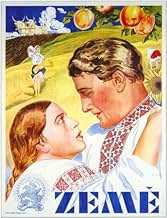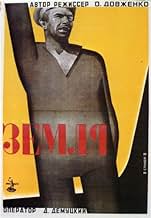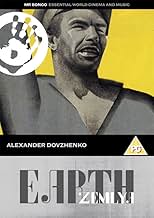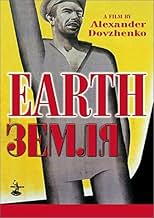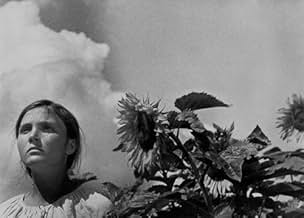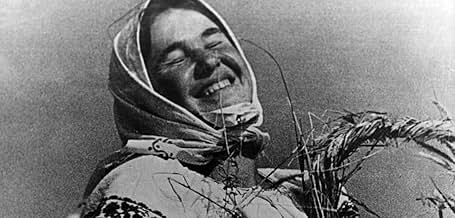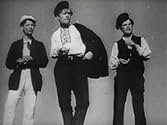IMDb RATING
7.2/10
6.8K
YOUR RATING
In the peaceful countryside, Vassily opposes the rich kulaks over the coming of collective farming.In the peaceful countryside, Vassily opposes the rich kulaks over the coming of collective farming.In the peaceful countryside, Vassily opposes the rich kulaks over the coming of collective farming.
- Director
- Writer
- Stars
- Awards
- 1 win & 1 nomination total
Stepan Shkurat
- Opanas
- (as S. Shkurat)
Semyon Svashenko
- Vasyl - son of Opanas
- (as S. Svashenko)
Yuliya Solntseva
- Daughter of Opanas
- (as Yu. Solntseva)
Yelena Maksimova
- Natalya - Vasyl's fiancee
- (as Ye. Maksimova)
Nikolai Nademsky
- Ded Semyon
- (as N. Nademsky)
Ivan Franko
- Kulak Belokon
- (as I. Franko)
Pyotr Masokha
- Khoma - son of kulak Belokon
- (as P. Masokha)
Vladimir Mikhaylov
- Priest
- (as V. Mikhaylov)
Pavel Petrik
- Young Party-Cell Leader
- (as P. Petrik)
P. Umanets
- Chairman of the Village Soviet
- (as Umanets)
Luka Lyashenko
- Young Kulak
- (as L. Lyashenko)
Vasiliy Krasenko
- Old Peter
- (uncredited)
M. Matsyutsia
- Farm Girl
- (uncredited)
- Director
- Writer
- All cast & crew
- Production, box office & more at IMDbPro
Featured reviews
10miloc
From its opening, with an elderly man dying surrounded by impassive adults and obliviously playing children, to its wildly emotional finale, this breathtaking silent work transcends its politics and functions as poetry. It's unmistakeably Soviet -- the messianic fervor of the scene in which the farming community greets the arrival of a tractor would seem like parody if it weren't for Dovzhenko's extraordinary sense of lyricism. Using repeated shots of the expectant farmers crying out "It's coming!" intercut with an empty horizon, he builds the moment so completely that you're excited in spite of yourself; you totally believe in that tractor. (As one of the "rich farmers" says, shellshocked by this threat to their future, "It's a fact. It's here.")
To call the film propaganda, while true, seems rather beside the point. Aren't all films? Dovzhenko's manipulations are certainly no less devious than those of western film. Switch the communist message to a patriotic or even capitalist one, and the setting to the World War II Pacific or the old west or wherever you choose and it's no different than, say, "Shane" or "Gone With the Wind" or "The Passion of the Christ" -- just much, much better.
The story, told in rich montages of motionless figures, fruit, machinery, skies, rippling fields, and above all faces, weaves its "official" message about collective farms and private property with larger themes of religion, the generation gap, and the cycle of life: the Earth that gives life takes it away. A group of children giggle and spy on an old man listening at his friend's grave for a last message; a man sits up on his deathbed to eat a last sweet pear; a serious young radical, alone, gives himself up to a joyful moonlit dance before falling into the dirt. Dovzhenko's approach has less to do with narrative than with creating visual textures; it looks as though Terrence Malick watched this more than a few times before making "Days of Heaven." Dovzhenko's discontinuities and repetitions can be initially bewildering, but they pack a concrete wallop. The images accumulate and crystallize, carrying greater and greater weight, and, as an aging farmer becomes suddenly radicalized by tragedy, the direct shots of his face, hardening in bewilderment and outrage, take on a thunderous power.
To call the film propaganda, while true, seems rather beside the point. Aren't all films? Dovzhenko's manipulations are certainly no less devious than those of western film. Switch the communist message to a patriotic or even capitalist one, and the setting to the World War II Pacific or the old west or wherever you choose and it's no different than, say, "Shane" or "Gone With the Wind" or "The Passion of the Christ" -- just much, much better.
The story, told in rich montages of motionless figures, fruit, machinery, skies, rippling fields, and above all faces, weaves its "official" message about collective farms and private property with larger themes of religion, the generation gap, and the cycle of life: the Earth that gives life takes it away. A group of children giggle and spy on an old man listening at his friend's grave for a last message; a man sits up on his deathbed to eat a last sweet pear; a serious young radical, alone, gives himself up to a joyful moonlit dance before falling into the dirt. Dovzhenko's approach has less to do with narrative than with creating visual textures; it looks as though Terrence Malick watched this more than a few times before making "Days of Heaven." Dovzhenko's discontinuities and repetitions can be initially bewildering, but they pack a concrete wallop. The images accumulate and crystallize, carrying greater and greater weight, and, as an aging farmer becomes suddenly radicalized by tragedy, the direct shots of his face, hardening in bewilderment and outrage, take on a thunderous power.
In Ukraine the landowners hold out against progress and the rights of communally worked farms of the people. When one such farm gets a tractor to further help them one of the richer farmers murders one of the collective, hoping to stop the movement in its tracks. However the opposite is true and the collective rises up out of the oppression and the tragedy to overcome the selfish and cruel approach of the rich.
This is one of those films that I knew I had to see rather than one of those films that are less well regarded but are less demanding to watch. I am glad that I finally got round to it because it is technically and visually a very good film with some very striking images. This is different from it being a good film due to the narrative though because in this regard it is quite a mixed bag. The structure of the tale is not great and it doesn't flow together in a way that I found engaging but more of concern to the modern viewer is the sweeping unquestioning propaganda that the story essentially is. It would be nice to pretend that this does not detract from the film but it does and not because I happen to disagree with the point being made but just because it is the simplistic clumsy point making of propaganda and it does jar slightly.
Dovzhenko's visuals are where the film is strongest though and it is worth seeing for this because whether is the depiction of sorrow or the beauty of the open fields, he catches it really well. If only he had done more with the performances then things would have been helped, not to mention the clunky dialogue cards (although I have to assume that those are mostly down to poor translation). So as long as you are not expecting this to be a fun experience or a great story then it is indeed a classic film that you should watch as part of an education in cinema.
This is one of those films that I knew I had to see rather than one of those films that are less well regarded but are less demanding to watch. I am glad that I finally got round to it because it is technically and visually a very good film with some very striking images. This is different from it being a good film due to the narrative though because in this regard it is quite a mixed bag. The structure of the tale is not great and it doesn't flow together in a way that I found engaging but more of concern to the modern viewer is the sweeping unquestioning propaganda that the story essentially is. It would be nice to pretend that this does not detract from the film but it does and not because I happen to disagree with the point being made but just because it is the simplistic clumsy point making of propaganda and it does jar slightly.
Dovzhenko's visuals are where the film is strongest though and it is worth seeing for this because whether is the depiction of sorrow or the beauty of the open fields, he catches it really well. If only he had done more with the performances then things would have been helped, not to mention the clunky dialogue cards (although I have to assume that those are mostly down to poor translation). So as long as you are not expecting this to be a fun experience or a great story then it is indeed a classic film that you should watch as part of an education in cinema.
Now I regret all the times I've railed about how propaganda is synonymous with contempt for the audience. It is sometimes hard to know what to say about a movie when it is a 'best of all time list' warhorse, but not this time. I have never - ever - seen a movie with a more deliberate, or surer, sense of rhythm. Two sequences that are nothing but long montages of fruit are absolutely riveting. A man sits, re-evaluating his world view, and because it takes a long time to do that we fade to black THREE times over about a minute, without him moving or changing position. This glacial tempo lulls us, so that Dovzhenko can jolt us with the arrival of a speedy tractor; or a collectivo's joyous dance through the dust over several lengthy wide shots is disrupted by his abrupt murder. Then the movie climaxes with an unbelievable crescendo where at least FIVE events are montaged, in perfectly comprehensible rhetorical construction. The movie begins with a death scene whose understated acting is mind-boggling even now, forget 1930; the final shot balances all the anti-church rhetoric with an image that is absolutely redemptive and spiritual, only the point is that redemption is found in LIFE. I'm not being pompous, this movie actually functions on that level. It achieves poetry AND propaganda in a way that I've never ever experienced before. It kind of reminds me of Brian Wilson's "Smile" in its modest grandeur, so true that it's painful, but so f***ing great that you want to experience it again and again. You can get it for free at the St. Catharines Library.
Dovzhenko was a 'modernist' who drew deepest inspiration from traditional arts. His ode to the beginning of the collectivization is actually an orgy of intoxicant images of bulging clouds, waving wheat fields, ripening fruits and pelting horses.
The arrival of a tractor is hailed by the farmers. They begin to believe that an improved life has started, but Kulaks murder the young leader of the village party committee. This only encourages the village inhabitants in their resoluteness. In a sublime finale sequence, Dovzhenko unites birth, death, harvest, technical progress and solidarity, when the dead are returned to Earth that he loved so much.
No abstract summary can do justice to the extraordinary sensualism of this remarkable film. Whoever searches for the roots of Andrei Tarkovsky's cinema has to start with "Zemlya".
The arrival of a tractor is hailed by the farmers. They begin to believe that an improved life has started, but Kulaks murder the young leader of the village party committee. This only encourages the village inhabitants in their resoluteness. In a sublime finale sequence, Dovzhenko unites birth, death, harvest, technical progress and solidarity, when the dead are returned to Earth that he loved so much.
No abstract summary can do justice to the extraordinary sensualism of this remarkable film. Whoever searches for the roots of Andrei Tarkovsky's cinema has to start with "Zemlya".
What an unusual and memorable film this is, almost more like a poem or an impressionist painting than a movie. It's filled with activity and images that push the actual story into the background. Sometimes the characters overreact to events in a highly exaggerated fashion, while at other times they barely respond to what happens - yet it seems both real and believable. The movie is probably not quite as great as some would have it, but it has an unusual appeal that makes you want to watch it (or, perhaps, experience it) over again.
The scenes often have little connection with one another, and it's clear that the plot is not meant to be the main emphasis. On the surface, the story is about the collective farm, their hopes of getting new machinery, and their rivalry with the independent landowners. But it's intended to be something more subtle and worthwhile than a political message. The themes and images involving the characters and, especially, the "Earth" itself, are more vivid than the slight story-line.
To be sure, the collectivist perspective from which the film was made is rather obvious. But that does not detract from this unusual achievement. And while it would not work as light or casual entertainment, it is well worth watching, and it's a movie you won't forget afterwards.
The scenes often have little connection with one another, and it's clear that the plot is not meant to be the main emphasis. On the surface, the story is about the collective farm, their hopes of getting new machinery, and their rivalry with the independent landowners. But it's intended to be something more subtle and worthwhile than a political message. The themes and images involving the characters and, especially, the "Earth" itself, are more vivid than the slight story-line.
To be sure, the collectivist perspective from which the film was made is rather obvious. But that does not detract from this unusual achievement. And while it would not work as light or casual entertainment, it is well worth watching, and it's a movie you won't forget afterwards.
Did you know
- TriviaSoviet censors made Aleksandr Dovzhenko eliminate a number of scenes from the film, including the scene of peasants urinating into a tractor radiator, and the scene of nude woman mourning over her dead fiance. The original uncut version was screened in Ukrainian republic when first released, and then in the Museum of Modern Art (New York City, USA) about 40 years later, on 10 October 1969.
- Alternate versionsIn 1997, the film was re-released in Germany by ZDF, with a new score composed by Alexander Popov. This version was digitally improved (known as Arte Edition), then released on DVD and distributed by the absolut MEDIEN GmbH in 2006. The running time is 78 minutes. The crew participants:
- Alexander Popov, Composer;
- Frank Strobel, Conductor;
- Evgeniy Nikulskiy, Sound engineer;
- Nina Goslar, Commissioning editor.
- ConnectionsEdited into Le tombeau d'Alexandre (1993)
- How long is Earth?Powered by Alexa
Details
- Release date
- Country of origin
- Official sites
- Languages
- Also known as
- Zemlja
- Filming locations
- Production companies
- See more company credits at IMDbPro
- Runtime1 hour 15 minutes
- Sound mix
- Aspect ratio
- 1.33 : 1
Contribute to this page
Suggest an edit or add missing content


